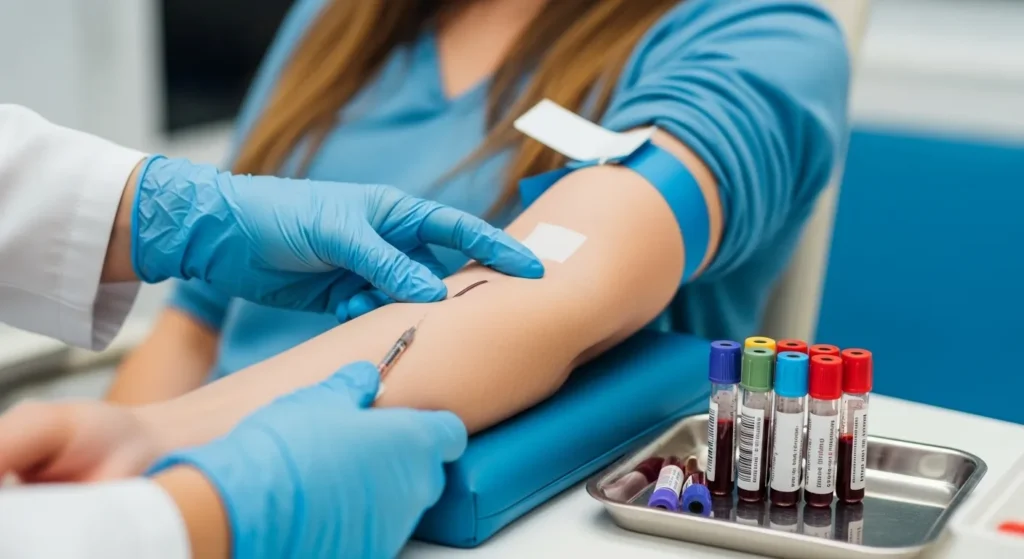Are you experiencing unexplained hair thinning or excessive shedding? A blood test for female hair loss can help uncover the root causes, such as hormonal imbalances, nutrient deficiencies, or thyroid issues, that are often invisible to the naked eye.
In this guide, you’ll learn which lab tests are most effective, what your results mean, and how a correct diagnosis leads to better treatment. Whether you’re seeking peace of mind or a medical plan, this article empowers you to take the first step toward healthier hair, backed by expert insights and real solutions.
Why Blood Tests Matter in Female Hair Loss Diagnosis

Hair Loss in Women: A Multifactorial Issue
Hair loss in women can be caused by a variety of factors, including genetics, hormones, nutritional deficiencies, autoimmune disorders, and stress. Unlike male pattern baldness, female hair loss is often diffuse, making the underlying cause harder to pinpoint without medical testing.
Role of Blood Tests in Identifying Underlying Causes
Blood tests help identify internal health problems contributing to hair loss. They allow doctors to measure hormone levels, nutrient stores, and thyroid function—all of which play a critical role in hair health. A thorough blood panel can prevent misdiagnosis and ensure the right treatment is given.
When Should You Consider Blood Testing for Hair Loss?
You should consider blood testing if:
- Hair is falling out in large clumps
- Shedding continues for more than 3 months
- Hair thinning is accompanied by fatigue, weight changes, or irregular periods
- You’ve tried topical treatments without results
Essential Blood Tests for Diagnosing Hair Loss in Women
Complete Blood Count (CBC)
This test screens for anemia and overall immune health. Low red blood cells or abnormal white blood counts can signal conditions like chronic inflammation or infection, which may contribute to hair loss.
Ferritin and Iron Panel
Iron deficiency is one of the most common causes of hair loss in women. Ferritin is the stored form of iron, and levels below 70 ng/mL can impair hair growth.
Tests to include:
- Serum Iron
- TIBC (Total Iron Binding Capacity)
- Transferrin saturation
Thyroid Function Tests (TSH, T3, T4)
An underactive (hypothyroidism) or overactive (hyperthyroidism) thyroid can cause diffuse hair thinning. These tests help assess thyroid performance and related autoimmune conditions like Hashimoto’s thyroiditis.
Vitamin D and B12 Levels
Low levels of Vitamin D and B12 can lead to hair shedding and poor regrowth. These nutrients support follicle cycling and overall scalp health.
Hormone Panel (Testosterone, DHEAS, LH, FSH, Estrogen)
Hormonal imbalances are often behind conditions like PCOS or menopause-related hair loss. Testing for androgens and reproductive hormones helps diagnose androgenetic alopecia or telogen effluvium.
ANA and Autoimmune Markers
If autoimmune hair loss (like alopecia areata or lupus) is suspected, testing for antinuclear antibodies (ANA) and other immune markers is essential.
Zinc, Magnesium, and Biotin (If Indicated)
These micronutrients play a role in cellular repair and keratin production. A deficiency can disrupt the hair growth cycle.
What Your Test Results Mean
Low Ferritin and Iron Deficiency Hair Loss
Ferritin levels under 30–50 ng/mL are strongly associated with chronic telogen effluvium. Supplementation with iron (under medical supervision) can restore hair growth over several months.
Thyroid Imbalances and Hair Thinning
Both hyperthyroidism and hypothyroidism can lead to hair loss. Normalizing thyroid hormones with medication often resolves hair issues within 3–6 months.
Hormonal Imbalances (PCOS, Menopause, Androgenetic Alopecia)
Elevated testosterone or DHEAS levels may indicate PCOS-related hair thinning. Menopausal women often experience hair loss due to declining estrogen levels. Hormone therapy or anti-androgens may be recommended.
Autoimmune Conditions and Telogen Effluvium
Positive ANA or other autoimmune markers can point to diseases like lupus or alopecia areata. These often require treatment with immunomodulators.
Nutritional Deficiencies
Low levels of Vitamin D, B12, or zinc can disrupt the hair cycle. A combination of dietary changes and supplementation can help restore balance.
What Happens After Diagnosis?
Treatment Based on Lab Results
- Iron Deficiency: Iron supplements + dietary changes
- Thyroid Issues: Hormone replacement therapy
- Hormonal Imbalances: Birth control pills, spironolactone, or HRT
- Autoimmune Hair Loss: Topical steroids, systemic medications
- Nutrient Deficiencies: Targeted vitamin/mineral supplements
Lifestyle & Dietary Adjustments
- Iron-rich foods (spinach, lentils, red meat)
- Biotin, zinc, and Vitamin D supplements
- Reduced stress through yoga, sleep, and mindfulness
When to See a Hair Loss Specialist or Endocrinologist
If test results are abnormal or you have persistent symptoms, consult a:
- A trichologist or dermatologist for scalp and hair evaluation
- Endocrinologist for hormonal or thyroid imbalances
- Nutritionist for dietary optimization
Treatment Plan and Progress Timeline
- Prescribed iron and Vitamin D supplements
- Thyroid medication initiated
- Hair shedding reduced within 2 months
- Noticeable regrowth by month 5
Where to Get a Blood Test for Hair Loss in Women
Local Labs and Clinics in Islamabad
Several diagnostic labs in Islamabad offer comprehensive hair loss blood panels, including:
- Chughtai Lab
- Shifa Labs
- Advanced Diagnostics
What to Expect During the Test
- Fasting may be required for hormone and iron panels
- Blood is drawn from a vein, usually in the arm
- Results are typically available within 24–72 hours
How to Prepare for Accurate Results
- Avoid biotin supplements 72 hours prior
- Schedule morning tests for hormone accuracy
- Inform your doctor about all medications or supplements
Expert Tips on Monitoring and Preventing Future Hair Loss
How Often Should You Retest?
- Every 3–6 months during treatment
- Annually, once levels normalize
Importance of Early Intervention
Hair loss is easier to treat in the early stages. Don’t wait for bald patches to appear; diagnose and address them early.
Supplements vs. Medical Treatments: What Works?
Supplements are helpful for deficiencies but won’t fix hormonal or autoimmune issues. A combination of both may be necessary based on test results.

Frequently Asked Questions (FAQs)
Can a blood test detect the cause of my hair loss?
Yes, blood tests can reveal internal imbalances like iron deficiency, thyroid issues, or hormonal problems that contribute to hair loss.
What if my blood tests are normal, but I’m still losing hair?
Hair loss could be due to stress, medications, or genetic predisposition. In such cases, further scalp analysis or biopsy may be needed.
How much do these tests cost in Pakistan or the US?
In Pakistan, a full panel may range from PKR 3,000 to 10,000. In the US, it can cost $100–$300, depending on insurance and provider.
Do I need a doctor’s prescription to get these tests?
Not always. Many labs offer direct-to-consumer testing, but a doctor’s review is important for interpretation.
Are these tests covered by insurance?
Coverage varies. Tests ordered by a physician for medical necessity are more likely to be reimbursed.
Ready to Diagnose Your Hair Loss?
Book a Consultation with Dr. Rana Irfan, a Female Hair Loss Specialist, in Islamabad Today.
Don’t let uncertainty delay your recovery. A personalized blood panel can reveal the true cause of your hair loss and help you start a targeted, effective treatment plan.
👉 Schedule your expert consultation now and take the first step toward thicker, healthier hair.
